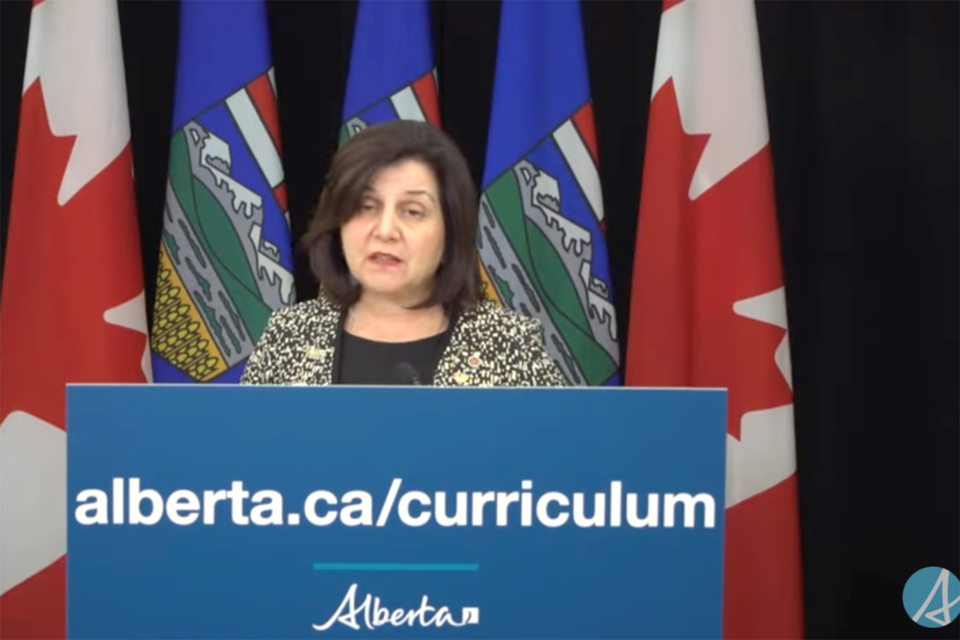The Government of Alberta will be moving forward with instituting parts of the new K-6 curriculum in the fall of 2022, based on what the Minister of Education describes as recommendations from the Curriculum Implementation Advisory Group.
The final K-3 English Language Arts and Literature, K-3 Mathematics and K-6 Physical Education and Wellness curriculum will be available in April and will be implemented at the start of the 2022/23 school year, said Minister Adriana LaGrange during an update March 10.
The new curriculum for Grades 4-6 for Mathematics and English Language Arts and Literature will be implemented in September of 2023.
The advisory group is expected to make recommendations on piloting and implementation strategies for the remaining K-6 curriculum by May of this year. The rest of the new curriculum includes French First Language and Literature, French Immersion Language Arts and Literature, Fine Arts; Science and Social Studies.
Speaking to why Mathematics and English Language Arts and Literature will be introduced at the lower grades sooner, LaGrange noted that work is already being done in the area due to challenges brought on by the pandemic.
Special attention and funding has been put toward ensuring young students are caught up with numeracy and literacy skills. In the fall of 2021, the province announced funding specifically to support K-3 students who had fallen behind during the pandemic.
"Now is the time," said LaGrange, adding she has heard from frontline teachers and administrators who also agree that this is the right time to introduce the new curriculum.
Introducing the K-3 curriculums for Math and Language Arts first will help teachers and learners transition, she said.
The Physical Education and Wellness curriculum will help support students by building resiliency and aiding them manage their health and mental health said LaGrang, noting that the life skills included in the new physical education curriculum are important.
Acknowledging that there have been calls to delay the implementation of the new K-6 curriculum, LaGrange says the government is committed to teaching students, improving outcomes and updating Alberta's "very outdated curriculum."
She says the advisory group has been able to provide Alberta Education with plenty of insight. The group is made up of teachers, administrators, superintendents, and others who work in education.
Funds have been committed to help with the K-6 curriculum implementation, which includes a total of $191 million to be used over three years. Funds will be used for professional development and to purchase learning and teaching resources.
The minister says the investment into education will benefit all Albertans.
"Our students deserve this new curriculum," said LaGrange.
The College of Alberta School Superintendents said it is happy to see a staggered implementation for the new curriculum.
"We look forward to the release of further information in the weeks ahead and reviewing curriculum changes based on broad feedback," said Wilco Tymensen, president with CASS.
Implementation of new K-3 math, English Language Arts and Physical Education curricula will affect about 390,400 students and 37,100 teachers in Alberta.
Following LaGrange's update, Alberta Teachers' Association (ATA) president Jason Schilling released a statement, speaking out against the implementation of the new curriculum.
"Enough is enough. The proposed curriculum does not enjoy public support, and the consensus opinion of groups representing parents, teachers, school boards and education faculty is that it cannot be implemented in its current form. It has not been appropriately piloted, and teachers do not have what they need to put it in front of students in only six months," said Schilling.
The ATA recently released information that shows just three per cent of teachers believe they have the supports and resources required to successfully implement the curriculum this fall.
Schilling also added, "Implementing new curriculum in one grade and one subject requires a significant amount of planning, preparation and resource development on behalf of individual teachers. Expecting teachers and schools to implement curriculum in four grades and three subject areas all at once next school year is a recipe for chaos after two very exhausting years for teachers and administrators."
During Wednesday's update, LaGrange was specifically asked about the survey results released by the ATA. The minister said she had not yet seen the survey, but in the past felt results for surveys done by the ATA included a small number of respondents. She said she would look into the concerns expressed.
Reaffirming the province's decision to proceed with implementation of the new curriculum, the minister said "We do believe there is enough time." Teachers are already teaching, and introducing the new curriculum "isn't starting from scratch," she added.
Virtual engagement sessions were held in January and February to allow Albertans to have their say on the cirrculum and the draft Social Studies blueprint.
"The feedback we received from these sessions, as well as all other engagement opportunities and classroom piloting, is informing the final K-6 curriculum."
Before offering the update on the curriculum - and in response to criticism from Alberta's NDP - LaGrange affirmed that the Government of Alberta will continue to teach about Ukraine's rich history in its updated curriculum. She noted that the social studies portion of the curriculum is still in the works.



